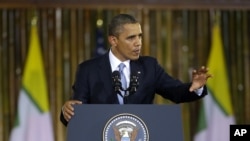U.S. President Barack Obama has voiced concerns about Cambodia's human rights record in what U.S. officials describe as a "tense" meeting with Cambodian Prime Minister Hun Sen.
Obama, who arrived in the capital, Phnom Penh, Monday, raised the issue of free and fair elections and the detention of political prisoners.
U.S Deputy National Security Adviser Ben Rhodes said Obama told the prime minister those issues are an "impediment" to the United States and Cambodia developing a deeper relationship.
Cambodian officials said in response that the concerns about human rights are exaggerated.
After the talks with Hun Sen, the U.S. president met with the 10 leaders attending the Association of Southeast Asian Nations summit in the capital.
In another development, Cambodian rights groups voiced disappointment about the adoption at the summit of an ASEAN Declaration of Human Rights, saying the declaration does not go far enough to ensure rights for all people. The head of the Cambodian Center for Human Rights, Ou Virak said that, for example, the declaration gives people the right to demonstrate, but not if the demonstrations affect a country's social order.
President Obama arrived in Phnom Penh from Burma, where he addressed a crowd at the University of Rangoon earlier in the day. Obama said he had come to keep his promise and extend "the hand of friendship." He added that "flickers of progress" that have been seen must not be extinguished, but must become - in his words - "a shining North Star" for all the nation's people.
Earlier in the day, Obama met separately with Burmese President Thein Sein and democracy icon Aung San Suu Kyi in the country's main city of Rangoon.
Obama, who arrived in the capital, Phnom Penh, Monday, raised the issue of free and fair elections and the detention of political prisoners.
U.S Deputy National Security Adviser Ben Rhodes said Obama told the prime minister those issues are an "impediment" to the United States and Cambodia developing a deeper relationship.
Cambodian officials said in response that the concerns about human rights are exaggerated.
After the talks with Hun Sen, the U.S. president met with the 10 leaders attending the Association of Southeast Asian Nations summit in the capital.
In another development, Cambodian rights groups voiced disappointment about the adoption at the summit of an ASEAN Declaration of Human Rights, saying the declaration does not go far enough to ensure rights for all people. The head of the Cambodian Center for Human Rights, Ou Virak said that, for example, the declaration gives people the right to demonstrate, but not if the demonstrations affect a country's social order.
President Obama arrived in Phnom Penh from Burma, where he addressed a crowd at the University of Rangoon earlier in the day. Obama said he had come to keep his promise and extend "the hand of friendship." He added that "flickers of progress" that have been seen must not be extinguished, but must become - in his words - "a shining North Star" for all the nation's people.
Earlier in the day, Obama met separately with Burmese President Thein Sein and democracy icon Aung San Suu Kyi in the country's main city of Rangoon.

